Intervention and Censorship: Freedom Isn't Everything
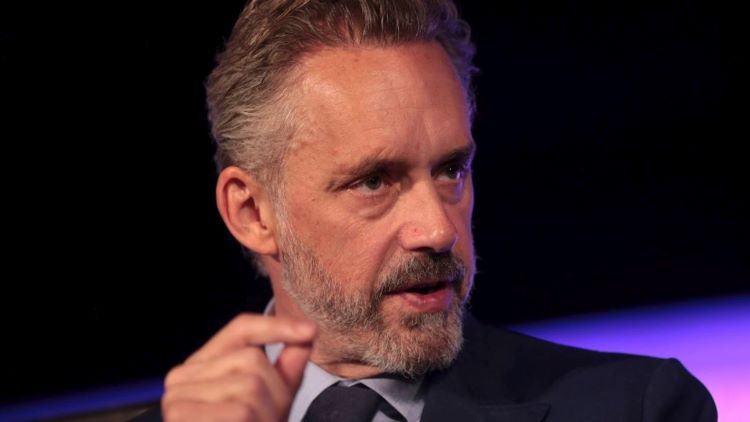
Featured image: Professor of psychology Jordan Peterson, as someone who overtly values personal freedom, is generally ideologically opposed to censorship and compelled-speech laws. But we all seem to value freedom highly because when we are free we have genuinely available choices to make. But sometimes this is a bad thing; sometimes others should intervene to stop us and remove our freedoms, much to the dismay of people, like Peterson, whose ideologies are invested in them. Welcome to a case against freedom. (Flickr-Gage Skidmore | CC BY SA 2.0)
Personal freedom is entrenched in popular thought as something we should value with the highest regard. We celebrate it in pop culture, promote and fight for individual rights as citizens, and democratically write it into our political constitutions. Millions have even selflessly died for it. Yet here I am, ready to ringfence it.
To tell you the truth, freedom isn’t all that.
Human nature
It’s a luxury that I can freely express myself and act on behalf of myself to do the things I want to do. I can air my opinions online, I can choose my line of work, and I can vote for the policies I believe in—the list goes on. However, there are limits to what I can legitimately do: I can be punished for my freely born words and my physical actions. For example, I have to abide by community standards on social media and I’m not legally permitted to be racist or sexually inappropriate; I cannot be employed into areas of work I am not qualified for, under an employer’s jurisdiction; and I can’t vote if I’m under a certain age or if I’m a citizen of a country different from that in which I reside. Yes, I am free to try to get my own way but I will suffer the consequences of doing so in line with the law, where the law is used as a gun against my head, so to speak, to restrict my words and actions. That is, my personal freedoms are justly restricted—a timely remark, for at the time of writing people are being forcibly quarantined in China for the good of their communities.
Imagine a totally free society in which we could express ourselves freely, in speech and physical action. Call me cynical but, given that we are selfish beings who cohabit a planet which contains finite resources and a mixture of opinions, we might ruin what civilized society has achieved together. If we could say and do anything and endlessly consume whatever we wanted and move and settle anywhere at a whim, our empathy would be eroded by distrust. People would become rivals who, ominously, held similar desires for the same objects.
Conflict would be inevitable. We’d trample over each other for our personal stories and ideologies to be individually heard. We’d reduce communities to groups of individuals fraught with divisive struggle. Genuine compassion, our instrument for orientating our interests to one another, would be hard to come by. In a worst-case scenario, the world would fall to our mutual hostility. It takes an optimist to think an unruly society would come together for a common good.
Societal progress has intermittently occurred because we’ve organised powers above us to not let us slip into free-for-all dystopias.
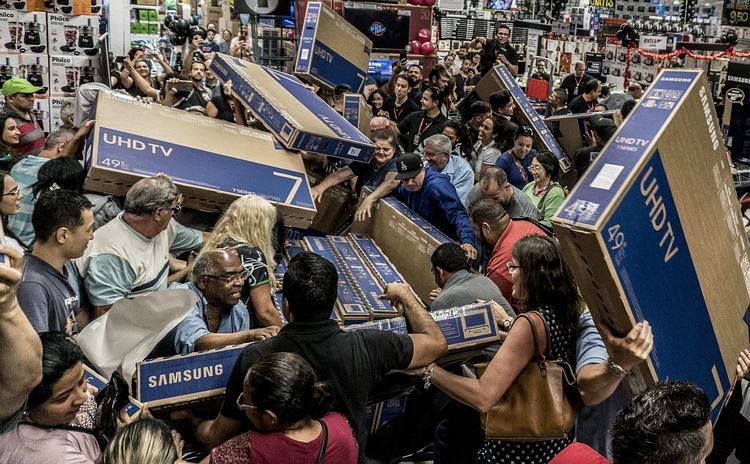
Consumerism has consumed us: People fight to be the first to buy widescreen televisions on Black Friday as discounts invigorate America. (Getty Images)
Without overarching authorities to hold people we feel threatened by at bay, we’d begin to live in a sea of fear, rife with distrust in our cohabitants. But, absurdly, distrust is especially common when people feel safe and entitled—say, when they are in positions of power or live in quiet, ethnically uniform towns and villages. People who disagree or who come from different backgrounds are seen as aggressors who subvert values. Fundamentally, regardless of our backgrounds, we’re all more similar than we like to think.
However, communities are built on values that ‘outsiders’ might not share; we’re each concerned for fragile worlds—worlds which change around us and we’re helpless to stop it. Our insecurities get the better of us. Societies humans build together deteriorate because of the nature that made us.
Governments, with law and order, combat human selfishness and a potential state of nature with their powerful hands. They control, to some extent, what we say and do and, in many ways, are the lynchpins which forcibly hold us together. Every law they pass restricts us in some way because we can’t be trusted to form self-governing, harmonious societies which reach peace without a codex of behaviours being enforced upon them.
Begging the question
Governments intentionally block much of what we can say and do. We consent to this, usually via elections, conferring to them mandates for limiting our own freedoms. They are not always fair and just. When they do this civil disobedience becomes a necessity. To quote Thomas Jefferson, ‘When injustice becomes law, resistance becomes duty’. But we should only fight governments with shared values and reason at our collective’s foundation; to Hell with blind selfishness.
Think about the consequences of being anarchically free—the technology we have access to, the way we’re all connected. Earth. Insecurity will destroy the systems we’ve come to depend on for justice without law and order: why should I show good will if I can’t trust anyone else to do the same? Unrestrained and emotionally stunted with respect to people we don’t know yet, now and in future generations, we will slowly destroy ourselves.

Wildfires destroy Amazonian forests because of our consumption of goods. As I listlessly read the echoing opinions of some famous figures on the subject of freedom, I'm struck by how far they will take freedom's importance to be. While it's usually a great thing to strive for, it isn't the only thing we should care about. With untethered capacity to say and do as we pleased, there would just be dire consequences for us as a whole. Even now, as we flourish economically and distribute Earth's resources with ruthless efficiency, our freedom is destroying possibly the only home we'll ever have.
Intervention undermines our individual will as we become aware of our freedoms being snatched away—no one likes to succumb to it. But there are infinite ways of expressing ourselves; laws provide manuals on which ways we can enact and how, curtailing us already.
In hindsight we should see we’ve benefitted from this: law and order protect us from each other (e.g. from undue violence and slavery) whilst enshrining many great liberties (e.g. being able to travel between countries and marry each other). When we purposefully adhere to these laws we adhere to the meddling instructions of governments. We don’t complain about the losses in freedoms we agree with—I believe I shouldn’t steal from someone, is hardly a controversial thought, for example; so I don’t feel aggrieved that I can’t enact it. In fact, we consent to losses in freedoms by granting governments mandates through (hopefully) democratic process such as fair elections and referendums. We do feel aggrieved, however, when freedoms we feel entitled to are taken away. This begs the question: what makes some freedoms okay but others not? We should concede that freedom, by itself, is not a politically meaningful thing to covet in our constitutions. The million-dollar question should become: which freedoms are freedoms worth having?
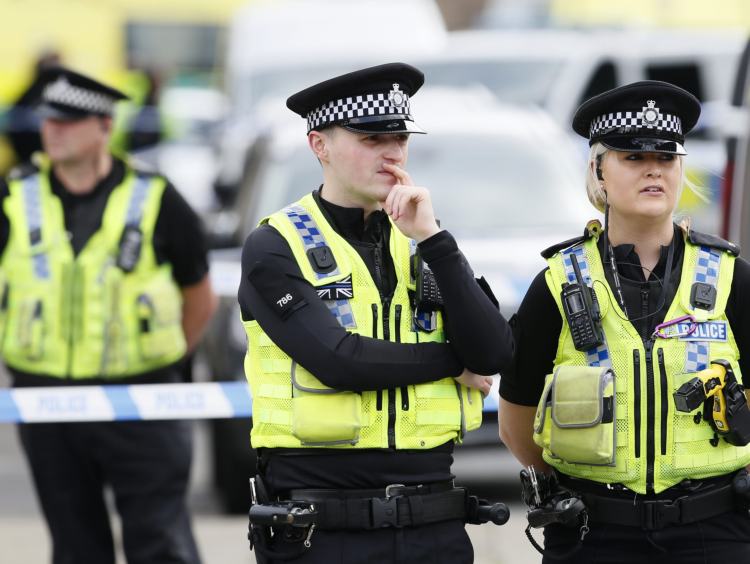
Pictured: Officers of the UK police force have garnered a bad reputation over time. But governments, through law and order, use them to reach into society and force fair play, limiting free action to that which is legal. Decent law-making law enforcement, unsurprisingly, isn't given much prominence in the media. (Press Gazette)
Censorship
Freedom of speech is a recognised human right which supports individual freedoms in communicating ideas without the fear of legal action or censorship. Even within this frame, however, free speech is already restrained for what I think are mostly good reasons. We’re forbidden from defamation, committing hate crimes, and inciting terrorism, for instance, while there are guidelines about what we can and can’t watch and what data we can digitally access and store and what we can whistle-blow. Meanwhile, when barriers are removed between people—say, on Twitter or 4chan or during live streams—they frequently reduce themselves to recklessly baseless behaviour for the sake of it: people are constantly being arrested for trolling, while real-life hate crimes are on the rise. These facts symbolise malignancies in humankind—malignancies we should surely protect people from. (If you concur with these policies, which stem from the Human Rights Act in the UK, you agree, in principle, that speech should be censored to some degree, at least. Too often people talk like they should be able to say anything to anyone when even they know they don’t abide by this when you put forward some acutely painful events from their past—they seek to pass judgement on things that do not affect them emotionally but are resistant to open discussions up to things personal to them.)
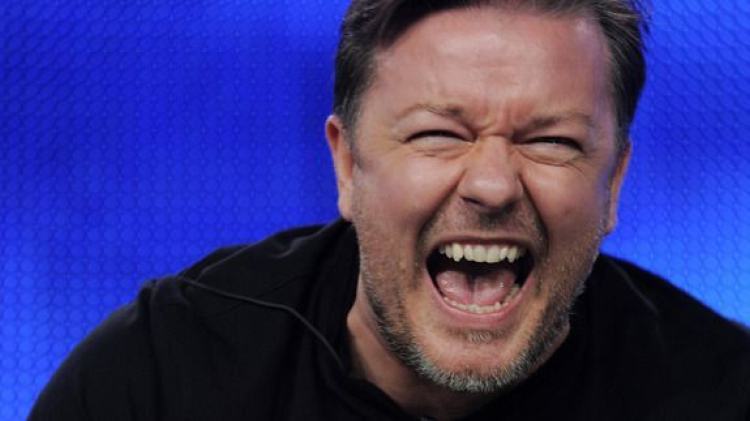
Ricky Gervais jokes about Caitlyn Jenner, Hitler, and rape and he doesn't care if you're offended. (Yahoo! News)
‘Free speech’ is a sensitive topic because people’s emotions (and sometimes lives) are at stake when they’re not protected. Words, spoken or written, are innocuous by themselves; but it’s the connotations we attach to them which cause ‘offence’ to be felt—and we ought to avoid such pain where we can! But opponents of this ‘soft’ form of social justice might, validly, claim that to control other peoples’ vocabularies like this is to fall into the controlling hands of overly sensitive people—people who might benefit from learning how to cope with social situations better. These people harvest their own pain, it’s claimed, because they’re entitled, social-justice-warrior ‘snowflakes’ persistently playing victims on topics such as gender expression, mental health, and xenophobia. They should learn how to be stoic, like people of old, ‘man up’, take it on the chin, and have more of a laugh.
The subjectivity at either end of expression and interpretation makes the task at hand more slippery: are they being too sensitive or is the other person being malicious? Semantics get lost in translation. Intent and context are important. We never know how someone else will react.
Personally, I don’t think we should censor public discourse, generally speaking, when it is critically evaluative or artistic or informative. On the other hand, I think censoring information is a good idea if the information being shared is malicious, inaccurate, or puts people in danger. Obviously, there’s no simple answer but a totalitarian approach to free speech, such as those common in archaic theocracies like Iran, whose regime commits serious human rights violations with its punishment on some speech, would let us all down. Equally, the legal prosecution of anti-vaccination campaigner in Samoa who used Facebook to wage a war against vaccinations in favour of ineffective homeopathic remedies feels justified amidst a deadly measles outbreak.

Is free expression in humour always worth it? The creators of South Park ridicule the censorship of the prophet Muhammad (of Islam) by Comedy Central. Having aired episodes featuring Muhammad before, in which residents fear a terrorist response to Family Guy airing a depiction of Muhammad, they tested the waters of comedy with satire once more by featuring his character and his name in episodes '200' and '201'. There's a cultural impact from any comedy—and the creators of South Park have arguably changed attitudes on minority religious groups, racial stereotypes, and disabled people. Who takes responsibility for it: just us? (Comedy Central)
I’d hate it if students at universities were unable to discuss societal issues critically with their safety assured—for example, to criticise the Bible. Sometimes I, too, want to laugh off moments of darkness; others I don’t want to ruin everyone else’s fun with my own pain. Generally, individuals shouldn’t be dictating how complex topics are discussed and processed by other individuals under the forceful hand of their own emotions: when they tell us what is offensive they ask us to act in ways according to their beliefs, whether this is with respect to gender expression or jokes made about trans people, obesity, and dead babies.
Free-speech entitlement isn’t just white dudes on the Internet. When others deem certain discourse inappropriate and muffle it—say, those who support compelled-speech laws—they take forms of individual expression away from us, however inappropriate they claim those forms of speech are.
That all being said, it’s absurd to think free speech deserves so much expenditure. Famous figures such as Ricky Gervais and Jordan Peterson lead crusades against censorship (in comedy and universities respectively). But do their movements deserve as much traction? Do people need to see so many vulgar things in the world? Do they need to learn about laws that are unlikely to affect them? Are people genuinely restricted in their daily lives in the ways they describe all that much? Censorship, to me, only feels restraining when it takes away something genuine from my arsenal. If I have something authentically critical or artistic to express, I immediately don’t think I should be imprisoned with my words. However, there will be cases, I think, where limitations imposed on my words are justifiable. My words carry risks and I’m happy for them to be scrutinised; I won’t defend them at all costs like these often do.
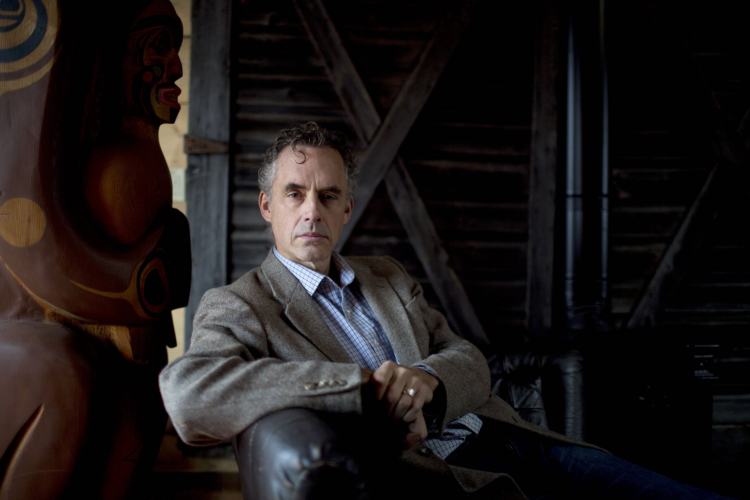
Jordan Peterson in Maps of Meaning: The Architecture of Belief: 'I regard free speech as a prerequisite to a civilized society, because freedom of speech means that you can have combat with words. That's what it means. It doesn't mean that people can happily and gently exchange opinions. It means that we can engage in combat with words, in the battleground of ideas. And the reason that that's acceptable, and why it's acceptable that people's feelings get hurt during that combat, is that the combat of ideas is far preferable to actual combat.' (Carlos Osorio—Toronto Star/Getty Images)
It’s often not clear how much we are being held back, in terms of our happiness, by censorship. If you can’t depict Muhammad or call someone of certain racial origins by a slur, why does it affect you in a negative way? Still, I think it sets a precedent for establishing personal-level censorship akin to thoughtcrimes.
Every interaction is unique and deserves special ad hoc consideration of intent and context accordingly in the free-speech debate, not generalised commentary on in the Internet designed to provoke and expand one’s own gluttonous entitlement. I don’t like where the debate about free speech often ends. People like to unnecessarily push the boundaries of their personal freedoms, deploying their powers of expression to test what they can ‘freely’ say, despite not wanting or needing to say it, on topics that do not affect their everyday lives. This is where I think the debate about free speech should be turned onto its head.
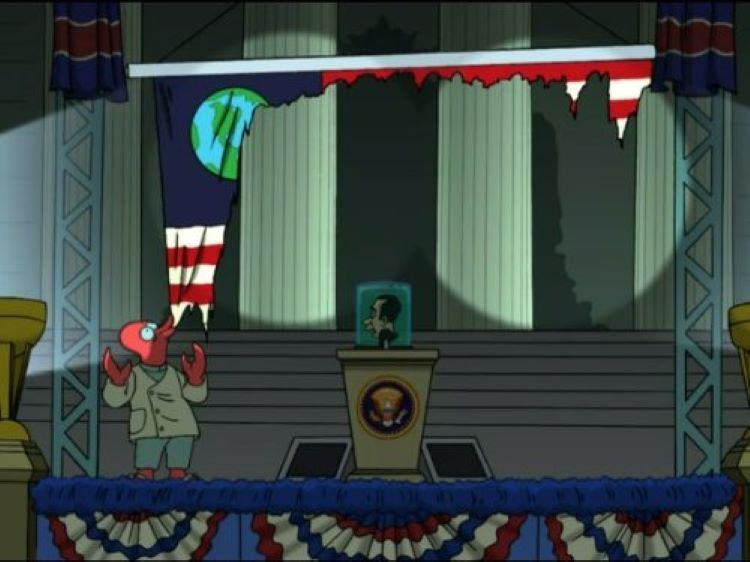
In Futurama S5E4 Dr Zoidberg, an immigrant, is sentenced to death for eating Earth's flag despite doing so on Freedom Day. People tend to love the idea of freedom. However, they generally won't accept the legitimacy of all kinds of freedoms in practice. (20th Century Fox Television)
‘Free speech’ is an unhelpful term because its use acts as a precursor for a loaded debate geared towards framing free speech as a right in itself, where any rules created to restrict certain arrangements and conveyances of words are labelled draconian because they hold us against our wills. We feel entitled to say anything and that’s where the buck stops, according to some, not with the consequences of those words.
My view is that verbal expressions should be seen as actions, where our deployments of words come with consequences, just like physical actions do, and where free speech is not assumed to be an automatic right. However, I don’t think censorship should come at the cost of cultural enrichment. What qualifies as this is the very thing we should be questioning.
What is freedom, anyway?
What freedom actually constitutes is difficult to clarify. However, we know it sits at the basis of ideologies of many different hues. Of course, there are more-hands-off approaches to politics which can be contrasted against interventionism. Capitalism, particularly laissez-faire economics, for example, is a distribution of goods and services through free-for-all private ownership and enterprise. Robert Nozick’s political philosophy is centred on the distributive justice of individual rights, where people’s business is people’s business. We must respect individuals enough for them to trade resources via ‘just’ transactions independently and minimise state’s involvement in their lives accordingly. Liberalism is a doctrine which seeks to promote and enhance personal freedoms based on an egalitarian notion of justice, which usually entails more state interference to obtain more social justice. Anarchism, meanwhile, represents a fight towards the abolition of overarching governmental powers—a state of incoherent anger directed at authorities who have agitated individuals by controlling their lives and who seek to avenge far-away freedoms they’ve lost or could have had.
Many popular arguments for freedom, however, are usually put forward validly. They are creative in captivating people’s attention but simple in argument: freedom is important; therefore, we should protect it with no expense spared. They predicate their argument on the idea that freedom is inherently valuable; so if we choose to believe this premise to be true, they can’t lose the argument. It follows that free speech is a prerequisite to a civilized society (Peterson), humour should have no bounds (Gervais), and individual rights must be fundamentally protected (Nozick).
However, they have to presuppose freedom’s importance beneath the kinds of freedom they want: they have to assume that more freedom leads to a better society. I argue that this is an empty statement without consideration of all the intricacies which come attached to controversial or complex incidences of free expression. We have already seen, empirically, how unrestrained humans act when left to their own devices in older societies, whilst we already accept many limits to our freedoms.
At the crux of the debate, in my view, is a question of which freedoms are conducive to a progressive society. But each kind of expression requires evaluation. Even though many freedoms are highly covetable, life is too nuanced for generalisations. Of course, this is a problem for governments, who need to come up with unilateral rules that generally cover most events (e.g. about hate crime and offence). This delicacy sits at the heart of the debate. But delicacy has no place in the polarised intervention and free-speech debate.
To make to a claim that freedom, by itself, is inherently valuable is to beg the question in favour of freedom—usually for your own convenience.
Socially, humans are self-aware, reflective agents who make decisions to meet their ends. We all believe we deserve certain things—that we have rights to hold extreme opinions, should we want to have them—and, in many respects, we do.
But we shouldn’t feel so entitled—so special—as imperfect and selfish as we are—to be motivated by obtaining freedom at all costs. This thought inspired me to get a tattoo in 2018 (below). Perched on a tree with one shoe on, a lady reveals a state of nature as she recklessly scares animals into fleeing away from her. For what?
We shouldn’t protect freedom as a right but as an instrument: it means nothing by itself. It’s a means to actualising what we value in the world—and we should evaluate what were free to say and do together in terms of the consequences of our personal freedoms on society. It is only true that you can say and do whatever the fuck you want if and only if you assume your freedom more important than any other considerations. Make your reality better than your nature by reasoning your way to common good; by embracing what we share and accepting your own fallibility with less ego and humility; and by acknowledging that the world changes—you just have to connect yourself to it and pull it in the right direction.
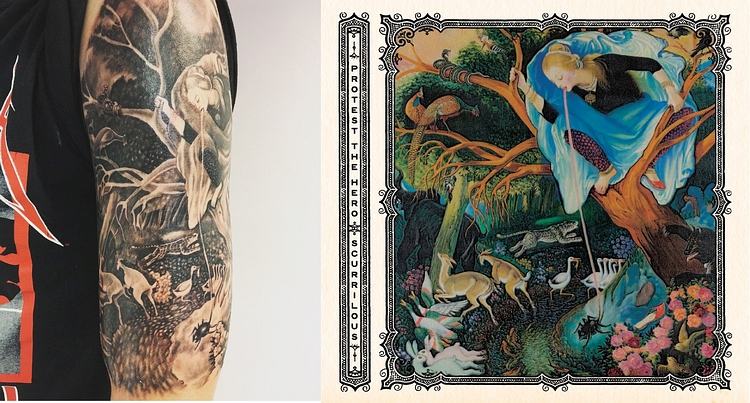
Scurrilous. (John Bell, Tainted Souls Tattoo Studio (left); Jafar Petgar (right))
